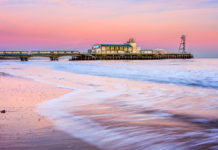A “misleadingly exaggerated” advert featuring Rachel Weisz has been banned in the UK.
Popular on LondonNet
The Advertising Standards Authority (ASA) ruled the 41-year-old actress’ complexion had been digitally changed in the image used to promote L’Oreal Paris Revitalift Repair 10, making it appear smoother and more even, upholding a complaint made by MP Jo Swinson.
The ASA ruled the advert can not be used again its current form because it “misleadingly exaggerated” the performance of the product and warned L’Oreal against using post-production techniques to misrepresent the effects of their products.
It ruled the advert could not be used again in its current form and warned L’Oreal against using post-production techniques to misrepresent what their products can achieve.
The ASA ruling said: “Although we considered that the image in the ad did not misrepresent the luminosity or wrinkling of Rachel Weisz’s face, we considered that the image had been altered in a way that substantially changed her complexion to make it appear smoother and more even.
“We therefore concluded that the image in the ad misleadingly exaggerated the performance of the product in relation to the claims (in the advert) ‘skin looks smoother’ and ‘complexion looks more even’.”
The ruling was welcomed by Ms. Swinson, the co-founder of the Campaign for Body Confidence.
She said: “The beauty and advertising industries need to stop ripping off consumers with dishonest images.
“The banning of this advert, along with the previous ASA rulings banning heavily retouched ads featuring Twiggy, Julia Roberts and Christy Turlington, should act as a wake-up call.
“Thankfully the advertising regulator has again acknowledged the fraudulent nature of excessive retouching.
“The Royal College of Psychiatrists has spoken out about the harmful influence of the media on body image and has highlighted the airbrushing and digital enhancement used to portray physical perfection as an area of concern.
“There needs to be much more diversity in advertising – different skin colours, body shapes, sizes and ages. Studies show that people want to see more authenticity from brands. Images can be aspirational without being faked.”
In a statement, L’Oreal said it had “sought to represent Rachel Weisz as favourably as possible and therefore every effort had gone into ensuring the most flattering set-up” by using a lot of light, soft focusing and lower resolution.
They added: “The ASA had previously ruled that cosmetics ads could present their product in the best possible light”.







